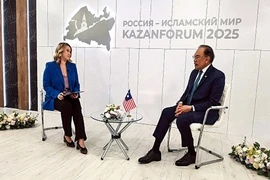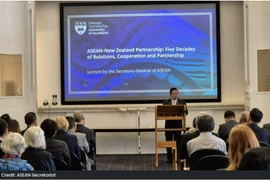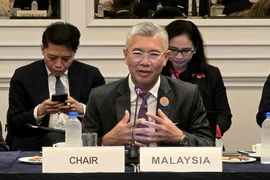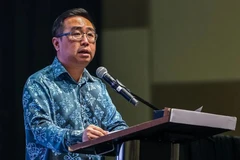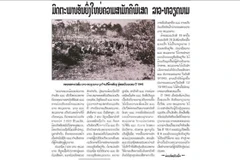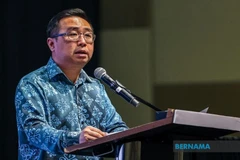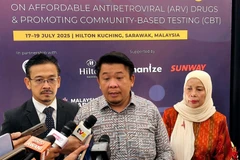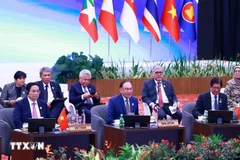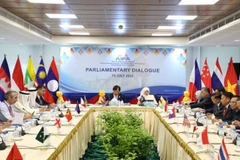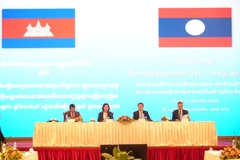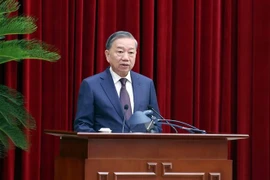Hanoi (VNA) - As ASEAN is positioning to be the heart of digital economy, fostering trust is key in reaping the benefits of growing digitalisation and further empowering the vulnerable segments of the population.
In the bustling streets of Jakarta, 50-year-old Siti (name changed) sits behind her food stall, where the aroma and sizzle of fried rice and grilled satay mingles with the hum of passing motorbikes. With a range of digital food delivery and e-commerce platforms helping her connect with more customers, business has never been better. While Siti still accepts cash, these digital apps have made it easier for customers to pay, and for Siti to manage her finances and bookkeeping, with a simple tap on her phone.
Siti is just one of 70 million micro entrepreneurs driving economic growth in the Association of Southeast Asian Nations (ASEAN) region. Over the last two decades, the region has seen its real GDP grow by 5% annually, reaching 3.8 trillion USD in 2023, making it the fifth-largest economy globally. With digitalisation empowering microenterprises like Siti’s, it is no surprise that ASEAN’s digital economy is poised to reach almost 2 trillion USD by 2030.
Digital Payments: Bedrock of Economic Growth
A foundational piece of this growing digital economy is the proliferation of instant payment systems (IPS) and more recently, the rapid adoption of low-cost national QR payment channels. From Indonesia’s QRIS to Cambodia’s KHQR and Thailand’s PromptPay, ASEAN has swiftly adopted the digital way to pay, with the share of digital payments to gross transaction volume already surpassing cash with just 48% in 2022 to about 56% in 2024.

With payments transmitted directly to the merchant’s digital accounts, microenterprises can now easily manage their books, helping them monitor the growth of their business.
ASEAN continues to make strides in building and expanding cross-border QR payment linkages. Through the commitment and hard work of the ASEAN Working Committee on Payment and Settlement Systems (WC-PSS), several ASEAN countries – Cambodia, Indonesia, Lao PDR, Malaysia, Singapore, Thailand, and Vietnam – are now able to conduct cross-border QR payment or person-to-person funds transfers. This means that financial processes that used to take days are now completed within minutes, enabling remittances, business payments including e-commerce, and tourism-linked transactions. This translates into bigger business opportunities for microenterprises. Advancing digital payments and finance platforms – which is also reflected in the ASEAN Digital Masterplan 2025, the Bandar Seri Begawan Roadmap, and the ASEAN Digital Economy Framework Agreement (DEFA) – is a testament of ASEAN’s collective vision for inclusive digital growth and increased accessibility especially for the smallest businesses, offering a more seamless system that lowers barriers to entry and reduces operational costs.
Trust - integral to fostering inclusion
Digital payments clearly serve as an entry point to broader financial services that help boost productivity and incomes for microenterprises. Yet despite the increasing digital savviness, microenterprises still face hurdles in accessing much-needed financing. This is exacerbated by microenterprises’ mistrust in the digital ecosystem due to cases of fraud, hidden fees, and lack of recourse, which could potentially undermine their growth. In Indonesia, for example, only 41% of merchants using QRIS completed at least one transaction per month, and 18% remained dormant, largely due to trust erosion from unexpected charges and unresolved disputes.
It is therefore imperative to build and ensure MSMEs’ continued trust in digital payments and the broader financial ecosystem. The United Nations' Better Than Cash Alliance’s Trust Quotient Policy Toolkit, which was developed together with the ASEAN Working Committee on Financial Inclusion (WC-FINC) and noted by ASEAN Ministers and Central Bank Governors, reflects the region’s collective commitment to this vision. The toolkit is testimony to the key role of policies and regulations as nascent IPS are being built and connected across borders.

Focusing on fraud, hidden fees, and lack of recourse, the Trust Quotient Policy Toolkit provides policy and regulatory recommendations to promote clear pricing, accessible dispute resolution, and transparent data practices, which will then help ensure micro-merchants confidently adopt digital payments in a safer, more accountable ecosystem. Ensuring quick and seamless recourse mechanisms, particularly for small-value disputes, is critical for fostering trust as delays or unresolved issues can significantly damage confidence. Programmes such as the ‘BOB’ (BSP Online Buddy) chatbot initiative by Bangko Sentral ng Pilipinas showcase how technology can simplify dispute resolution and build trust. Similarly, the Philippines’ Paleng-QR Ph and Indonesia’s QRIS SIAP have helped merchants through financial literacy, streamlined tools, and responsive support. Simplified data privacy disclosures can further empower merchants to navigate digital systems confidently.
Moreover, integrating support for digital financial services into existing MSME development programmes can be transformative. Indonesia’s Jakpreneur programme, for instance, onboards merchants to digital platforms but also provides training in financial literacy and business management.
For Siti, the success of her business relies not just on the convenience of digital payments but her trust in continued use of digital payments which grants her a formal financial history. By addressing challenges such as hidden fees, lack of recourse, and data privacy concerns, ASEAN can ensure that entrepreneurs like Siti feel confident in trusting and embracing digital transformation and ensure that no enterprise is left behind. This in turn, increases her opportunities to access formal credit to grow her business and income./.
